11 Scientifically Proven Weight Loss Tips
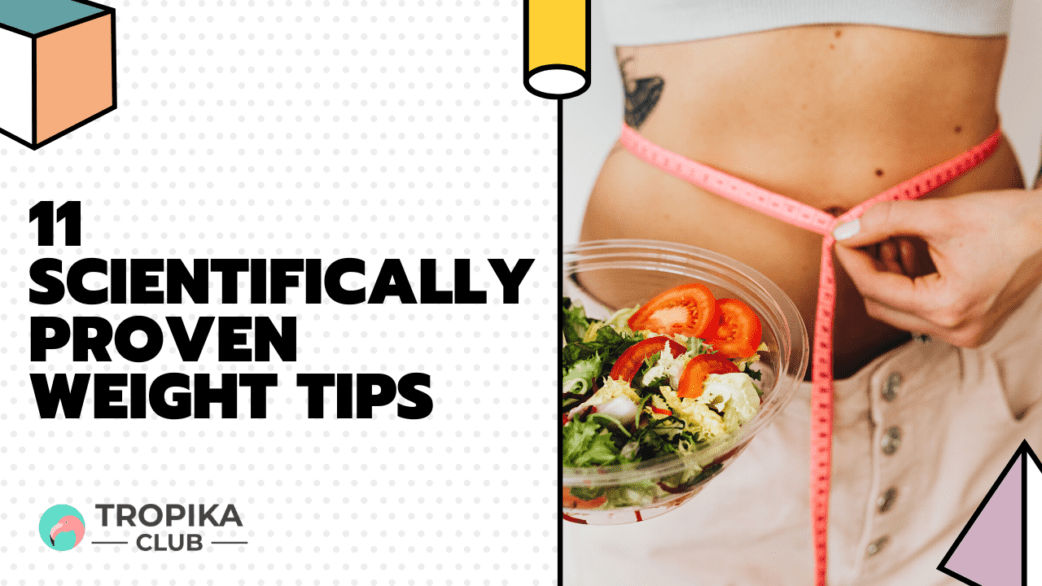
If you are thinking of going the scientific way to reduce weight, let us shed some light (or kilos) for you. The weight loss industry is full of myths. People are often advised to do all sorts of crazy things, most of which have no evidence behind them. However, there is a handful of weight loss tips that are actually proven by science and evidence, and will work well for losing that few kilos. Let the Tropika Club share these 11 weight loss tips which are actually scientifically proven.
No Time to Read? Here’s a Snappy Summary of This Article
- Tip 1: Drink water before meals – Drinking water before meals can boost metabolism, reduce appetite, and increase weight loss by up to 44% over three months.
- Tip 2: Eat eggs for breakfast – Eating eggs for breakfast can increase satiety, reduce calorie intake, and enhance weight loss compared to other breakfast options.
- Tip 3: Drink coffee or green tea – Drinking coffee or green tea can stimulate fat burning, improve energy levels, and provide antioxidants that can protect against diseases.
- Tip 4: Try intermittent fasting – Intermittent fasting as a dietary pattern that involves cycling between periods of eating and fasting, which can lower insulin levels, increase growth hormone levels, and enhance fat loss.
- Tip 5: Cut back on added sugar – Added sugar is one of the worst ingredients in the modern diet, as it can contribute to obesity, diabetes, heart disease, and cancer. It advises to limit the intake of sugary foods and drinks, and opting for natural sweeteners instead.
- Tip 6: Eat less refined carbs – Refined carbs are stripped of their fiber and nutrients, and can spike blood sugar levels, increase hunger, and promote fat storage. It advises to replace refined carbs with whole grains, fruits, vegetables, and legumes.
- Tip 7: Go on a low-carb diet – Low-carb diet can reduce appetite, lower insulin levels, and increase fat burning, leading to faster and more effective weight loss than a low-fat diet.
- Tip 8: Use smaller plates – Using smaller plates can trick the brain into thinking that one is eating more than they actually are, which can reduce portion sizes and calorie intake.
- Tip 9: Eat more protein – Protein is the most important macronutrient for weight loss, as it can boost metabolism, reduce appetite, preserve muscle mass, and increase fat loss.
- Tip 10: Eat more fiber – Fiber can help with weight loss by slowing down digestion, increasing fullness, and feeding the beneficial bacteria in the gut, which can improve metabolic health and reduce inflammation.
- Tip 11: Exercise regularly – Exercise is essential for weight loss and overall health, as it can burn calories, build muscle, improve mood, and prevent various diseases. It recommends to do both aerobic and resistance training for optimal results.
Table of Contents
- No Time to Read? Here’s a Snappy Summary of This Article
- 1. Eat Eggs For Breakfast
- 2. Cut Back on Added Sugar
- 3. Use Smaller Plates
- 4. Take Probiotic Supplements
- 5. Eat Spicy Foods
- 6. Do Aerobic Exercises
- 7. Do Anaerobic Exercises
- 9. Get Good Sleep
- 10. Chew More Slowly
- 11. Eat Less Refined Carbs
- Meanwhile, Check Out Tropika Club’s Ecosystem of Websites
1. Eat Eggs For Breakfast
Eating whole eggs can have all sorts of benefits, including helping you lose weight. Studies show that replacing a grain-based breakfast with eggs can help you eat fewer calories for the next 36 hours as well as lose more weight and body fat. Egg keep you feeling full much longer than cereal or toast.The protein and fat in eggs helps sustain your energy levels, keeping you satisfied for longer and reducing the need for a mid morning snack. While it’s true that eggs do contain a significant amount of cholesterol, the old formula of the cholesterol you eat impacting on your blood cholesterol levels, has been disproven. So there’s no need to worry about eating eggs increasing your risk for heart disease, yet improve your weight control.
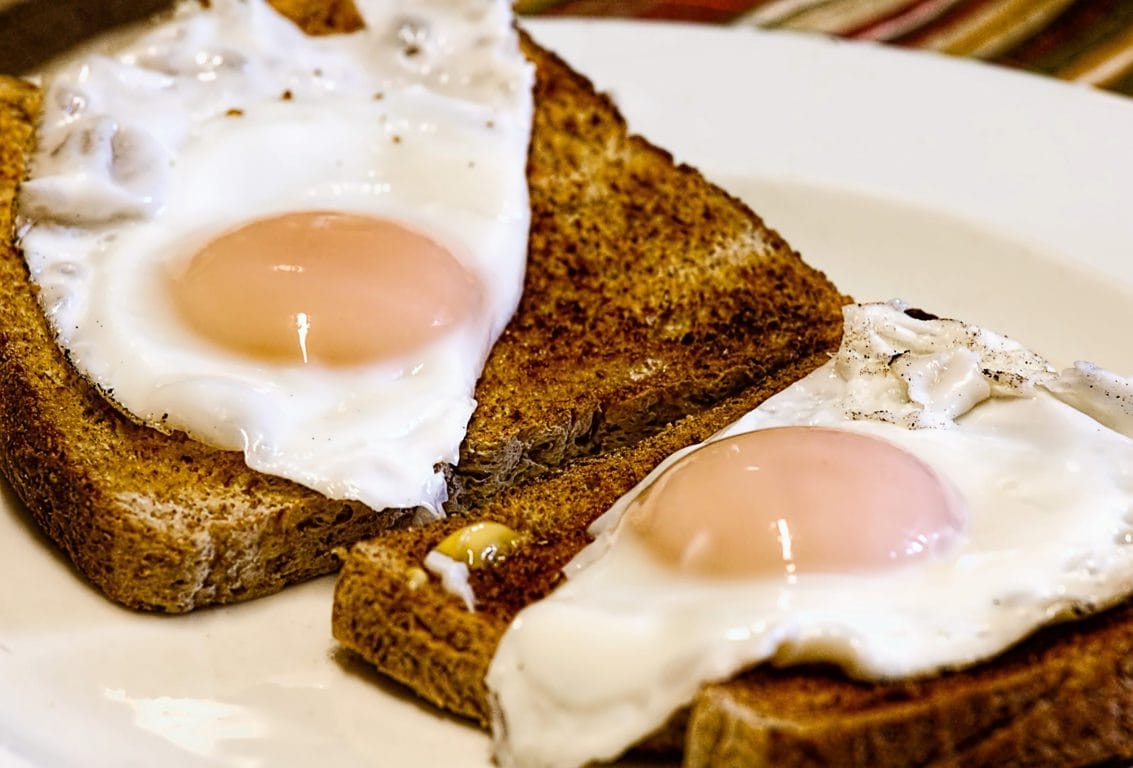
2. Cut Back on Added Sugar
Added sugar is one of the worst ingredients in the modern diet. Most people consume way too much. Keeping tabs on how much sugar you’re swallowing is an important part of a heart-healthy lifestyle, especially if you’ve been diagnosed with diabetes or prediabetes. The empty calories from added sugars in desserts, some drinks and candy can lead to weight gain and spikes in blood glucose levels.Swap out the soda. Water is best, but if you want something sweet to drink or are trying to lose weight, diet drinks can be a better choice than sugary drinks. Compare food labels and choose products with the lowest amounts of added sugars. Dairy and fruit products will contain some natural sugars. Added sugars can be identified in the ingredients list. Also, where possible, avoid processed foods, which may also destabilise your blood sugar levels.

3. Use Smaller Plates
Using smaller plates has been shown to help some people automatically eat fewer calories. While studies have proven over and over again that smaller plates lead to smaller portions the reason for this reduction had been unknown until recently. Wansink and van Ittersum have concluded that smaller plates cause us to eat less thanks to a powerful optical illusion known as the Delboeuf Illusion. If you put a small piece of food on a large plate, your mind will tell you that you are eating a small portion and you will automatically put more food on the plate. However, if you put that same piece of food on a small plate, your mind will tell you that you are eating a large portion and you’ll stop adding food. The image below depicts the Delboeuf Illusion and how it applies to food.
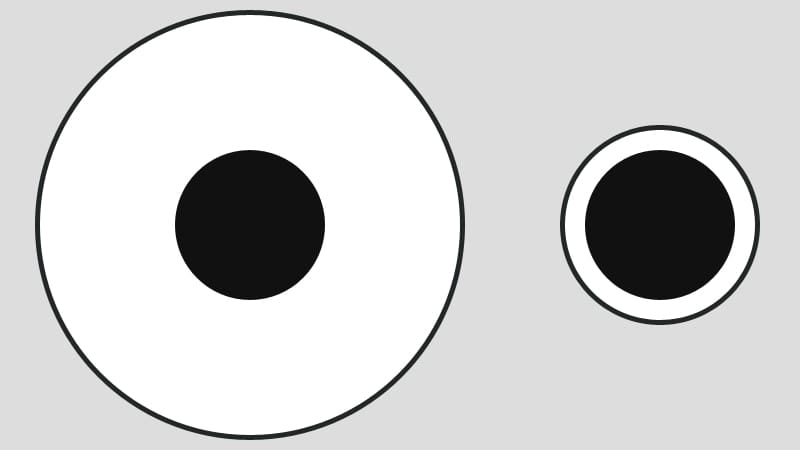
4. Take Probiotic Supplements
Taking probiotic supplements containing bacteria of the Lactobacillus subfamily have been shown to reduce fat mass and help with weight control. The first group of this healthy bacteria is called lactobacillus. This is found in a ton of foods that you probably already eat, like yogurt! The second main type of probiotic is bifidobacterium. It can be found in particular dairy products, so it’s another common healthy kind of bacteria.Gut bacteria are essential to our health. Not only do they affect our weight, but the types of bad bacteria that are in our gut can contribute to diseases such as chronic inflammation, unhealthy diet, leaky gut, and more.

5. Eat Spicy Foods
It can, according to a meta-analysis of 90 different studies that looked at the role of capsaicin in weight management. The analysis found spicy foods reduce appetite and that they increase energy expenditure. “Capsaicinoids are a group of chemicals naturally occurring in chilli peppers,” explains nutritionist Emma Derbyshire. “They have properties that may help to support weight management.”She explains that this means eating spicy food could potentially make you want to eat fewer calories than you otherwise would. This could be the main reason hot food is sometimes associated with weight loss.
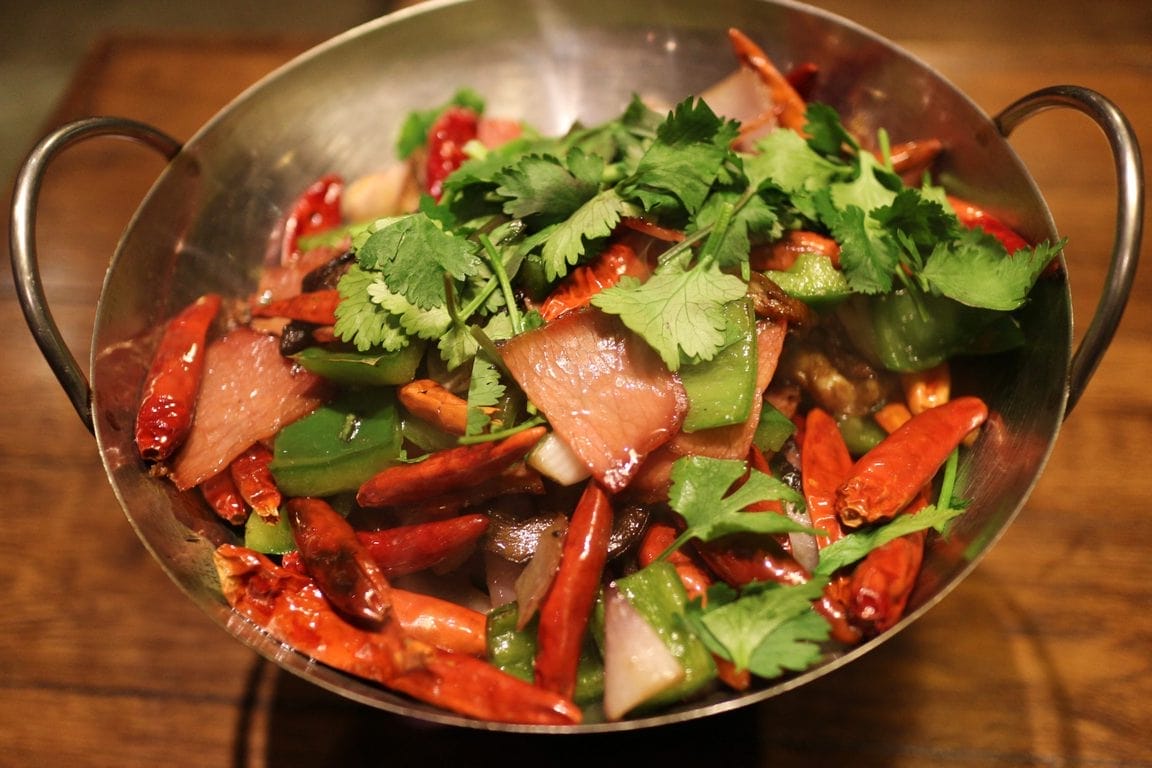
6. Do Aerobic Exercises
Aerobic exercise as part of your routine fitness regime, like walking, bike riding, or running, means you’re moving your body with fitness, breathing faster, and increasing your blood flow. It’s a level of activity that you can maintain for an extended period of time.
In aerobic, or “with oxygen” exercise, your muscles have enough oxygen to produce the energy needed to perform. Anaerobic “without oxygen” exercise means oxygen demand is greater than oxygen supply and you can’t keep up with the energy your body is demanding. This leads to lactate production and eventually the cessation of exercise, and help you to lose weight, as well as body mass.
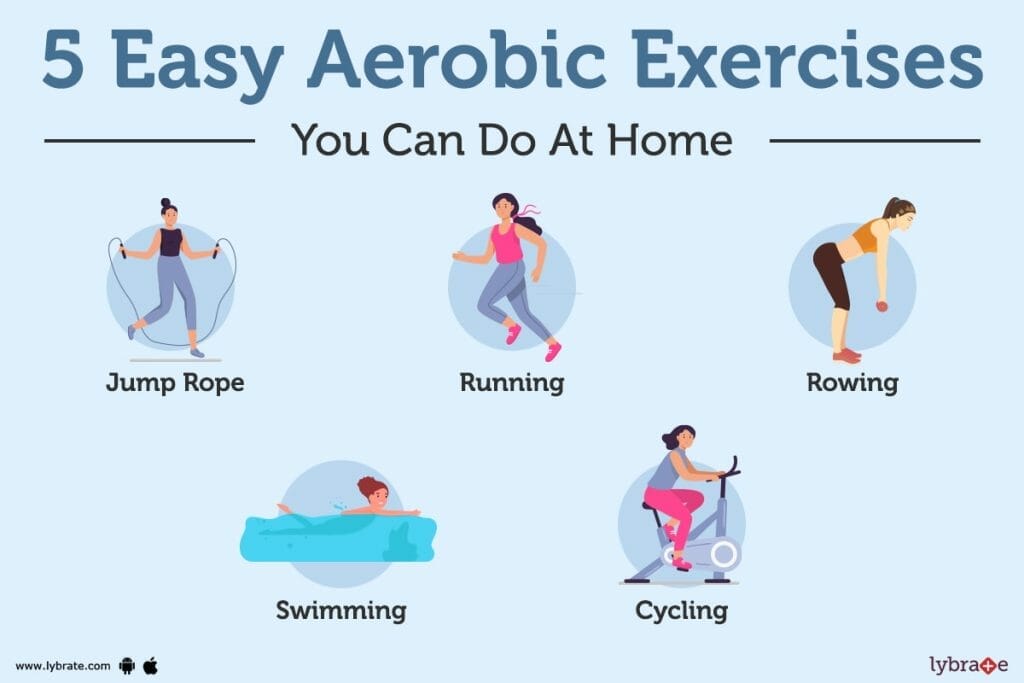
Read Also:
7. Do Anaerobic Exercises
Anaerobic exercise is performed in the form of high-intensity interval training (HIIT), where you rotate high-intensity intervals with recovery intervals as part of a fitness workout. This is beneficial for several reasons. First, you can get in an intense workout in a fraction of the time. If time is a limitation for you, a HIIT session is a great option. You’ll exhaust your muscles and burn more calories than you would in the same amount of time doing steady-state cardio.
Second, you’ll burn more calories in that amount of time. At the end of the day, the harder your workout is, the more calories you’ll burn. HIIT will cause your caloric expenditure to be higher than if you just walked or casually rode your bike for the same period of time.
While anaerobic exercise used to be something that mainly athletes did to increase performance, everyday exercisers can also benefit from this type of training. When you train at high levels of intensity, you increase your anaerobic threshold. That means you can work harder for longer periods of time, all while burning more calories and lose weight.
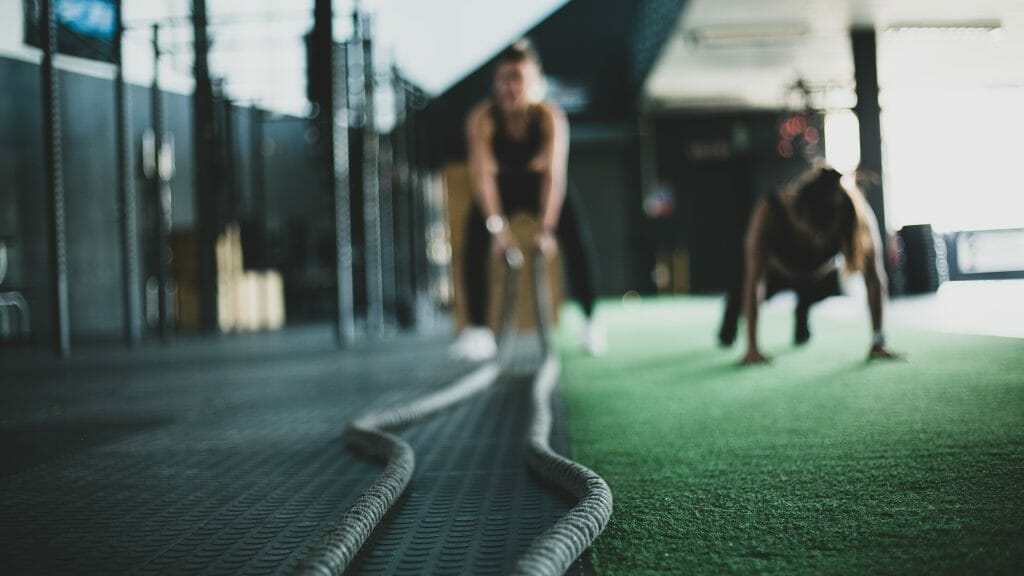
8. Eat More Fibre
Fibre is often recommended for weight loss. Eating more fibre can help you lose weight, even if you don’t make other changes to your diet. Fibre is super-filling. You digest it more slowly than simple starches and sugars. Plus, dieters who were told to get at least 30 grams of fibre a day, but given no other dietary parameters, lost a significant amount of weight. Not only is it great for keeping your appetite-and your weight-in check, fibre has loads of other health benefits. It’s heart-healthy, good for your gut health, can reduce your risk of diabetes and certain cancers and helps you poop on the regular.
According to the Harvard School of Public Health, the recommended daily fibre intake per day is 20–30 grams (g). However, many people in the United States only consume around 15g. A fibre supplement may help people who find it difficult to eat more fibre. However, fibre supplements are not a substitute for a balanced diet, although it is part of the healthy food chain.
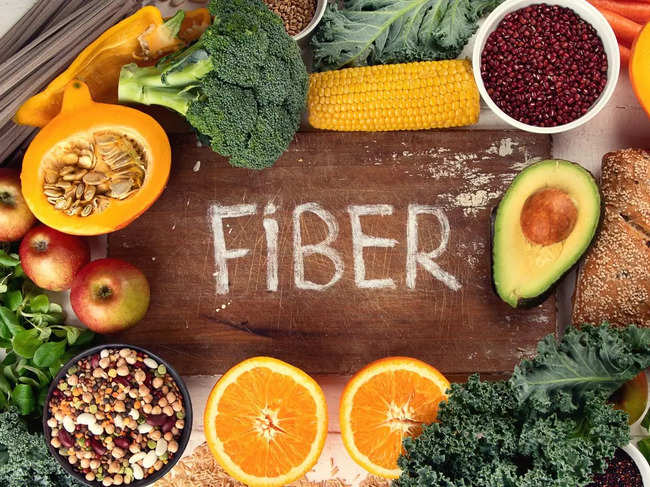
9. Get Good Sleep
Cutting back on sleep reduces the benefits of dieting, according to a new study. When dieters got a full night’s sleep, more than half of the weight they lost was fat. When they cut back on their sleep, only one-fourth of their weight loss came from fat. Sleep-deprived dieters also felt hungrier, producing higher levels of ghrelin, a hormone that triggers hunger and reduces energy expenditure.
What do these metabolically beneficial fats have to do with sleep? Sleep can contribute to the increase of these “good” fats in at least a couple of ways. Research has shown that the sleep hormone melatonin contributes to the increase of both brown fat and beige fat. Regularly getting enough high-quality sleep, sticking to a consistent sleep-wake cycle, and protecting daily circadian bio rhythms from disruption are all ways to encourage your body’s natural melatonin production, which may help your body make more of these weight-loss promoting fats.

10. Chew More Slowly
Eating more slowly while upping your chew count does not seem to make much of a difference, nutritionally speaking. But research suggests it may help control your appetite and weight gain. Some preliminary research has found that chewing until “no lumps remain” increases the number of calories the body burns during digestion: about 10 extra calories for a 300-calorie meal. (Eating fast, on the other hand, barely burns any calories.) Chewing food more thoroughly also increases blood flow to the stomach and gut. By taking a little extra time for chewing, someone could theoretically burn about 2,000 extra calories each month.
11. Eat Less Refined Carbs
Refined or simple carbohydrates include sugars and refined grains that have been stripped of all bran, fibre, and nutrients. These include fast food, white bread, pizza dough, pasta, pastries, white flour, white rice, sweet desserts, and many breakfast cereals. They digest quickly and their high glycemic index causes unhealthy spikes in blood sugar levels. They can also cause fluctuations in mood and energy and a build-up of fat, especially around your waistline.
When you eat refined carbs, your bloodstream is flooded with sugar which triggers a surge of insulin to clear the sugar from your blood. All this insulin can leave you feeling hungry soon after a meal, often craving more sugary carbs. This can cause you to overeat, put on weight, and over time lead to insulin resistance and type-2 diabetes. Diets high in refined carbs and sugar have also been linked to high blood pressure, heart disease, obesity, hyperactivity, mood disorders, and even suicide in teenagers.
There are some easy ways to avoid refined carbs. A person can make healthful decisions, such as eating fruit if they want something sweet and opting to eat brown rice or whole grain bread rather than white rice or bread. It is also best to avoid adding sugar to food. Adding sugar to food does not boost its nutritional value. When shopping, a person can check the labels to help them make healthful decisions.
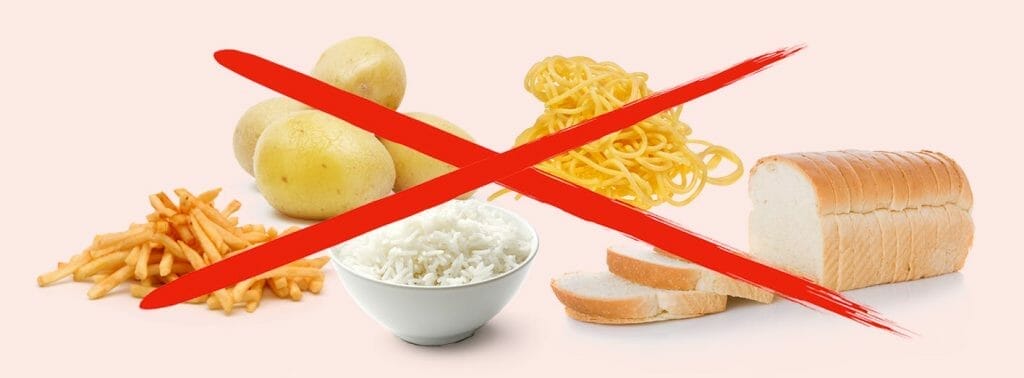
Conclusion
- Summary: Weight loss tips that are simple, effective, and science-based – The article has shared 11 weight loss tips that are based on scientific research and can help people lose weight in a healthy and sustainable way.
- Recommendation: Implement the tips that suit your lifestyle and preferences – The article has suggested that people can choose the tips that work best for them, and incorporate them into their daily routine, without being too restrictive or obsessive.
- Call to action: Start your weight loss journey today and enjoy the benefits – The article has encouraged people to take action and start their weight loss journey today, as it can improve their physical and mental health, confidence, and quality of life.

Frequently Asked Questions (FAQ)
Q: How much water should I drink before meals?
A: Drinking about half a liter (17 ounces) of water 30 minutes before meals, which can help reduce calorie intake by up to 13%.
Q: What are some examples of refined carbs that I should avoid?
A: Common sources of refined carbs are white bread, white rice, white pasta, pastries, cookies, cakes, candy, soda, and fruit juices.
Q: How do I start intermittent fasting?
A: Different ways of doing intermittent fasting, such as the 16/8 method, the 5:2 method, or the eat-stop-eat method. The article advises to consult a doctor before starting intermittent fasting, and to ease into it gradually.
Q: How much protein should I eat for weight loss?
A: Optimal protein intake for weight loss may vary depending on the individual’s age, activity level, and goals. However, a general guideline is to aim for 0.7–1 gram of protein per pound of body weight per day.
Meanwhile, Check Out Tropika Club’s Ecosystem of Websites

Tropika Club Magazine – Tropika Club Magazine is a Singapore-based publication that features articles on a wide range of topics with a focus on local businesses and content for the region. The magazine emphasizes supporting local businesses through its #SupportLocal initiative, which includes coverage of everything from neighborhood hawker stalls to aesthetic clinics in town. In addition to highlighting local businesses, Tropika Club Magazine also covers a variety of local content, including beauty, lifestyle, places, eats, and what’s on in Singapore and the Asia Pacific region.
Tropika Club Deals – Tropika Club Deals is a leading online deals and voucher shopping site in Singapore, offering amazing discounts on beauty, wellness, and fitness products and services. It’s the perfect platform for customers who want to discover the best deals without having to commit to a specific appointment date and time. These deals are available at major beauty stores, facial salons, hair salons, and other brands in Singapore, with no minimum spend required. Choose from guaranteed discounted deals in the categories of hairstyling, hair removal, facial & aesthetics, body slimming, brows & lashes, nails & makeup, massage & spa or fitness & wellness. Tropika Club Deals is also ideal for customers who want to buy vouchers as gifts or to use for the future. So whether you’re looking to save money on your next haircut or want to treat yourself to a relaxing massage, Tropika Club Deals has got you covered with the best voucher and coupon deals in Singapore!




